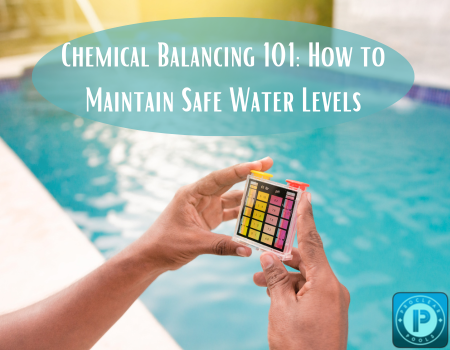Owning a pool in Arizona is a great way to stay cool and enjoy the sun, but keeping your pool safe and comfortable for swimming requires proper chemical balancing. High temperatures, increased evaporation, and frequent use mean that pool chemistry can quickly become unbalanced. Understanding the basics of chemical balancing will help you maintain safe water levels, ensuring a healthy swimming environment year-round.
Chemical Balancing 101
Understanding Key Water Chemistry Components
To properly balance your pool water, you need to understand four main components: pH, chlorine, alkalinity, and calcium hardness.
 pH Levels: pH measures the acidity or alkalinity of your pool water. It should be maintained between 7.4 and 7.6 for a safe, comfortable swimming experience. If pH levels are too high, your pool water can become cloudy, and if they’re too low, it can cause skin and eye irritation.
pH Levels: pH measures the acidity or alkalinity of your pool water. It should be maintained between 7.4 and 7.6 for a safe, comfortable swimming experience. If pH levels are too high, your pool water can become cloudy, and if they’re too low, it can cause skin and eye irritation.- Chlorine: Chlorine is essential for killing bacteria and keeping the water sanitized. Chlorine levels should be maintained between 1 and 3 parts per million (ppm). It’s important to monitor chlorine levels frequently, especially during the hot summer months when chlorine evaporates faster.
- Total Alkalinity: Alkalinity helps buffer the pH level and prevents rapid fluctuations. For optimal results, keep your pool’s total alkalinity between 80-120 ppm.
- Calcium Hardness: This measures the level of calcium in the water, which prevents corrosion of your pool’s plaster, tile, and equipment. A healthy range for calcium hardness is 200-400 ppm. In Arizona’s hard water areas, it’s crucial to monitor this level regularly.
For help maintaining these water chemistry levels, Pro Clear Pools offers a variety of pool testing kits and products, along with professional advice to keep your pool water perfectly balanced.
Testing Your Pool Water Regularly
Consistent water testing is important for proper pool maintenance. Ideally, you should ensure that your pool water is checked at least once a week. In the summer, or during periods of heavy pool use, more frequent testing (two to three times a week) may be necessary.
You can use pool test strips or a liquid test kit to check pH, chlorine, and alkalinity levels. Make sure to follow the instructions on the test kit to ensure accurate results.
Adjusting Chemical Levels
If your water test indicates an imbalance, here’s how to adjust each component:
- Raising or Lowering pH: To increase pH levels, add a pH increaser, commonly sodium carbonate. To reduce pH levels, apply a pH decreaser, which is typically composed of muriatic acid or sodium bisulfate. Be cautious with chemical additions and follow the instructions to avoid over-adjusting.
- Increasing or Decreasing Chlorine: If chlorine levels are low, you can add more chlorine in the form of tablets, liquid, or powder. During periods of intense heat or after heavy use, you may also consider “shocking” your pool, which involves adding a large dose of chlorine to eliminate contaminants. If chlorine levels are too high, simply wait for them to decrease naturally or consider using a neutralizing agent.
- Balancing Alkalinity: To raise alkalinity, add baking soda (sodium bicarbonate) to the water. Lowering alkalinity is slightly more complex and requires careful addition of muriatic acid in small doses. Remember to test pH levels afterward, as alkalinity changes can affect pH.
- Adjusting Calcium Hardness: If your calcium hardness is insufficient, you should add more calcium chloride to the pool.. Low calcium hardness can lead to erosion of pool surfaces, so it’s essential to address it. If it’s too high, you may need to partially drain and refill your pool to reduce calcium levels.
For more detailed guidance, Pro Clear Pools provides comprehensive instructions on chemical adjustments and can assist with custom treatment plans.
Preventing Common Chemical Issues
High temperatures and constant evaporation in Arizona can lead to some common chemical imbalances. Here are a few tips to prevent these issues:
- Use a Pool Cover: Covering your pool when not in use helps reduce evaporation and minimizes the loss of chemicals. It also keeps debris out, which can affect water chemistry.
- Shock Your Pool Regularly: Shocking your pool once a month, or after heavy use, helps maintain water clarity by removing contaminants that regular chlorine treatments might miss.
- Regular Filter Maintenance: A clean filter helps with circulation and allows your pool’s chemicals to be more effective.
Maintaining safe and balanced pool water is essential for a pleasant swimming experience, and regular chemical balancing can prevent many issues down the line. Pro Clear Pools offers a range of products, testing services, and expert advice to help you keep your Arizona pool safe and inviting. With the right guidance, your pool can remain a refreshing oasis all year long.
Whether you’re a DIY enthusiast or looking for professional assistance, Pro Clear Pools has everything you need to maintain safe water levels and enjoy a sparkling pool in the Arizona heat.
